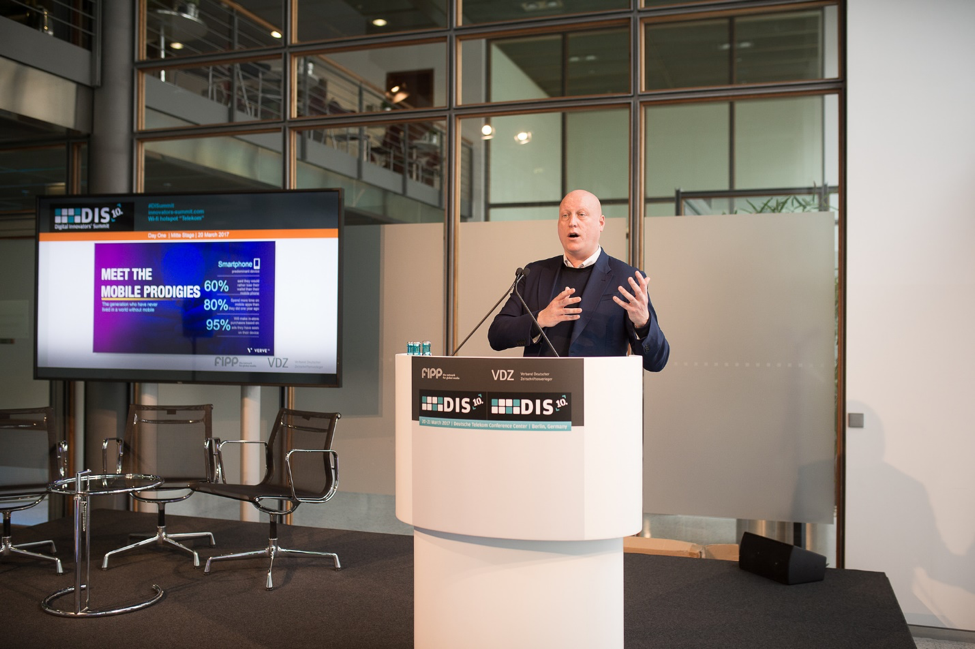Millennials and mobile prodigies: lessons on ad engagement, with Verve’s Ian James
Verve stands as the leading location-based mobile platform globally, providing advertisers and publishers alike with a full end-to-end service and solution, and provides true first party mobile location data to expand the potential of their digital media.

Ian’s fascinating and insightful presentation channelled all his experience and focused on the findings from some of his recent research on millennials and ad engagement.
Mobile prodigies
Ian began by describing a demographic known as “mobile prodigies”: those with a very tight bond with their mobile devices, who have never lived in a world without mobile (Generation Z and millennials, mainly).
Here are some key statistics from Ian’s research:
● 60 per cent [of mobile prodigies] would rather lose wallet than mobile phone.
“This was not surprising to us,” said Ian, “as the mobile phone is the wallet now in some ways.”
● 80 per cent spend more time on mobile apps than they did one year ago.
“Apps are growing in popularity and offer a totally different environment to desktop and mobile internet,” Ian added. “Adblocking has tapered out at 22 per cent in the UK, with a shift back to premium content publishers.” This is definitely a very topical trend, with many other talks at DIS covering a similar subject.
● 95 per cent will make instore purchases based on ads they have seen on their device.
“This is the good news for those of us in this industry – it’s an astonishingly high percentage,” said Ian. “This was quite surprising, if I am totally honest.” It is worth remembering, he added, that this generation is happy to share personal data if it improves their user experience.
“All about me” attitude
Next Ian went on to explain how the “all about me” attitude of mobile prodigies and their expectations of hyper-individualisation are prevalent in his research.
• Personalisation of ads is expected: 80 per cent of mobile prodigies expect tailored ads that recognise their interests and habits. “And adblocking is a very real option for these consumers. Marrying creativity with data is an important opportunity – using smart insights from data, we can create better ads,” Ian said.
• Location relevancy is key – knowing where consumers go, and how often. “What mobile prodigies are saying is, ‘don’t serve me an ad which isn’t relevant to where I am today’,” said Ian. “We need to find a way of knowing where consumers are at any one moment.” 77 per cent of this group prefer ads customised to their current activity, with 71 per cent preferring ads that relate to their location.
• Engagements will increase with innovation – mobile prodigies are willing to engage if it’s good quality. “The message here is, ‘I’m up for it if you get it right’,” said Ian. 42 per cent of mobile prodigies will click on an ad for more information – if the ad is tailored to their current location, context and time of day, and if it’s creative.
So, how do we get it right with Gen-Z and millennials?
Ian ended his presentation with some sound, straightforward advice based on the insights gained from his research.
In order to effectively engage with this group known as mobile prodigies, he encouraged his audience to:
● Be innovative
● Tailor to location and other factors
● Accept that data-sharing is a given with this generation – they expect to have to give away personal details, as long as it’s in exchange for innovation and creativity in ads
● Be smarter with customer segments – looking at the intersections of age, location, net worth, interests, house price, etc., in order to serve the most appropriate ads.
More like this
John Wilpers showcases top trends included in new FIPP Innovation World Report
How The New York Times brings the audience inside
Voice is the next major disruption in computing – Amazon exec
Video strategies for a visual world – with AJ+ and AwesomenessTV
Media and marketing in a connected world
Audience engagement: why a platform-appropriate content strategy is crucial
The battle for attention in a digital world [incl. video interview]









